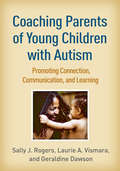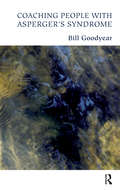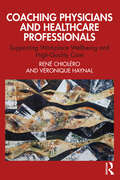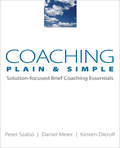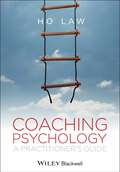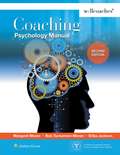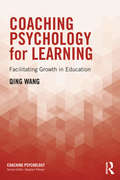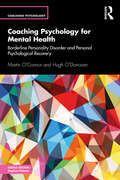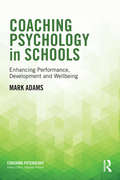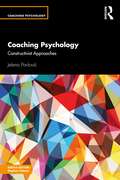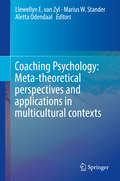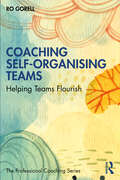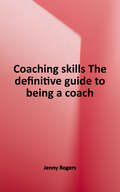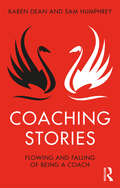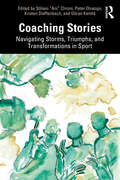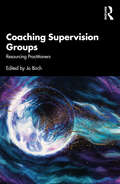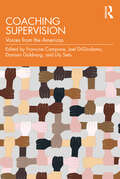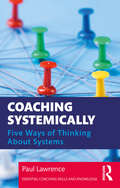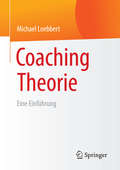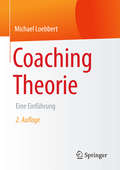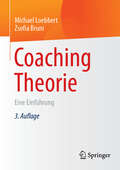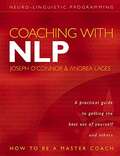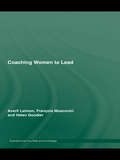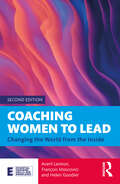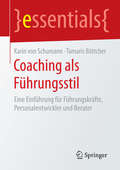- Table View
- List View
Coaching Parents of Young Children with Autism: Promoting Connection, Communication, and Learning
by Geraldine Dawson Sally J. Rogers Laurie A. VismaraA growing body of evidence supports the benefits of high-quality parent interventions for building social and communication skills in 0- to 5-year-olds with autism spectrum disorder (ASD). How can clinicians coach parents to effectively incorporate learning opportunities into daily routines at home? From preeminent experts, this practical book explores the role of the coach and reviews the "whats," "whys," and "how-tos" of successful collaboration with parents. Topics include structuring coaching sessions, identifying children's needs, facilitating playful engagement, and deepening parents' understanding of how they can boost skills development during everyday activities. Seventeen reproducible handouts and forms include the multipage P-ESDM Infant–Toddler Curriculum Checklist, ideal for use in telehealth assessments. Purchasers get access to a webpage where they can download and print the reproducible materials in a convenient 8 1/2" x 11" size.
Coaching People with Asperger's Syndrome: Family Coaching
by Bill GoodyearThis book arises from a lifetime's practical experience of work with people with Asperger's syndrome and autism. People with Asperger's syndrome easily drop through the net and fall into the wrong services - sometimes staying at home, depending on their families, sometimes falling into criminal justice or mental health services. Others, of course, fall into employment. Those in between, and there are many, benefit from the coaching approach developed by Bill Goodyear, which is described in this book. The book is crammed with practical tips, real life stories and new thinking. So often research results arrive from highly specialised work - this book attempts to synthesise a range of new learning from a number of fields and present a hopeful view of the condition - there are many entry points to use to create the possibility of forward motion and development.Touching lightly on some specific and recurring problems, the book unpicks our current understanding of the condition and describes in detail how to use coaching to empower and enable rather than to control and direct.
Coaching Physicians and Healthcare Professionals: Supporting Workplace Wellbeing and High-Quality Care
by Veronique Haynal René ChioléroThis important volume applies the practice of professional coaching to the hospital setting specifically, imparting the authors’ rich experience of coaching healthcare providers to other coaches working within the field. The book details how coaches can tailor their skills to the complex world of the modern hospital where physicians, nurses, medico-technical staff, managers, and administrators must carefully coordinate their efforts to be successful in high-stakes situations. It moves through the various stages of coaching, starting from the initial contact with management to the different applications of individual and team coaching, addressing common client issues including failing leadership, crisis, conflict, violence, and burnout. Each chapter includes clinical vignettes and theoretical ideas supported by field-specific research and literature. The book’s final reflection proposes changes to be considered to improve the functioning of hospital care teams, job satisfaction of healthcare professionals, and, ultimately, patient outcomes. Coaching Phsycians and Healthcare Professionals is essential reading for professional coaches and mentors active in the hospital setting, as well as coaches in training, consultants, and all hospital professionals.
Coaching Plain & Simple: Solution-focused Brief Coaching Essentials
by Peter Szabó Kirsten Dierolf Daniel MeierAn easy-to-read, pocket-sized primer on brief coaching basics. This is a highly practical and condensed introduction to solution-focused coaching, offering a simple and clear structure for coaching sessions that is easy to learn. Content is illuminated through exemplary dialogues from real coaching sessions and bullet-point toolboxes for greater variety of choice. Narrative explanations create a helpful framework for understanding the general idea of coaching and the practicalities of the solution focused approach. Several illustrating graphs and symbols give the book an easy to read, light touch. The book targets beginners in coaching who are looking for simple guidance and step-by-step ideas in their learning process. Topics include: What is coaching? * Coaching--simple, concise and effective * Overview: Major elements of the coaching conversation * Contracting--before you start * Coaching agreement for the first session * Preferred Future * Resources and forerunners of solutions * Small steps and clues of upcoming progress * Session conclusion * Follow-up sessions * Brief coaching of executives--three examples * Beyond technique--continuous learning as a coach
Coaching Psychology
by Ho LawCoaching Psychology: A Practitioner's Guide takes an in-depth look at the applications and everyday challenges faced by real-world practitioners of coaching and mentoring psychology, and is ideal as a companion to The Psychology of Coaching, Mentoring and Learning. This guide presents the first book to translate a unified approach to coaching and mentoring into a guide for practice. It is ideal for coaches, mentors, psychologists, and other professionals interested in this area of practice.
Coaching Psychology Manual (Second Edition)
by Margaret MooreNow in full color and, examples, and real-life scenarios, this comprehensive guide covers techniques and concepts for supporting clients in changing the behaviors and mindsets needed to thrive in all areas of wellness, including fitness, nutrition, weight, mind/body, stress, and management of life issues that impact well-being. Reviewed by the American College of Sports Medicine, the gold standard in credentialing health and fitness professionals, exercise and weight guidelines, sports medicine, ensures quality, currency, and accuracy. Examples of coaching dialogs, specific to the skills discussed offer additional insights and perspectives on effective coaching practices. Important! boxes draw attention to must-know information for facilitating productive and powerful client sessions. Don't forget. . . boxes highlight critical points to keep in mind while building relationships with clients. Review and discussion topics give you a chance to practice chapter concepts. Online instructor ancillaries include eBook and Image Bank.
Coaching Psychology for Learning: Facilitating Growth in Education (Coaching Psychology)
by Qing WangThe contribution of coaching psychology to educational fields is increasingly recognised. This timely book introduces coaching psychology as a facilitative method to support learning in different educational contexts.Coaching Psychology for Learning: Facilitating Growth in Education is conveniently organised into three parts: Part One begins with a detailed account of educational paradigms, learning theories, and coaching psychology theories; it then reviews important studies of coaching applied to the educational field and identifies a number of gaps to which coaching psychology for learning can contribute; Part Two presents two empirical participatory studies of coaching psychology for learning, which draw from both doctoral research conducted in the UK and educational work in Mainland China; two original and evidence-based coaching models are also illustrated; Part Three consolidates the empirical evidence and original coaching models by exploring the nature of educational coaching, including the context, purpose, processes, and people and their interrelations. The review of learning theories and coaching psychology theories in Part One enables the reader to gain a quick understanding of coaching psychology and its role in education, while the empirical studies in Part Two are particularly useful for undergraduate and postgraduate students, providing practical examples of how to conduct coaching psychology research in the field of education, in both the West and the East. The book also offers advice on design and implementation issues, which will benefit educational psychologists and coaching psychologists who wish to focus their professional practice in education.Coaching Psychology for Learning is essential reading for any teacher, student or practitioner who wishes to become an educational coach to facilitate learning. It will appeal to coaches and coaching psychologists, including those in training and at postgraduate level, as well as professionals in educational settings, such as school leaders, counsellors and coaches, and educational psychologists.
Coaching Psychology for Mental Health: Borderline Personality Disorder and Personal Psychological Recovery (Coaching Psychology)
by Hugh O'Donovan Martin O'ConnorTraditionally, coaching psychologists have worked with people who aren’t experiencing significant mental distress or have diagnosed mental illness. This book describes an innovative and challenging project of bringing coaching psychology to the lived experience of individuals with a diagnosed mental illness, Borderline Personality Disorder (BPD). The authors present a case for why coaching psychology needs to be constructively challenged to broaden its base and be more inclusive and of service to people experiencing BPD in particular. The book describes a coaching interaction involving coaching psychologists and a number of individuals with BPD who had completed a behavioural skills programme (Dialectical Behaviour Therapy; DBT). It explores the epistemological and practice tensions involving the dominance of clinical recovery (elimination of symptoms) in mental health services and personal or psychological recovery (originating in the narratives of people with a diagnosis of mental illness who yearn to live a life worth living). This book, written amidst the Covid-19 pandemic, makes a compelling case for coaching psychologists to engage with the philosophy and practice implications of personal recovery, at both professional and personal levels. It will be vital reading for those engaged in coaching psychology and for the education, training and continuous professional development of coaches and coaching psychologists.
Coaching Psychology in Schools: Enhancing Performance, Development and Wellbeing (Coaching Psychology)
by Mark AdamsCoaching psychology is a distinct branch of academic and applied psychology that focuses on enhancement of performance, development and wellbeing in the broader population. In Coaching Psychology in Schools, Mark Adams demonstrates how psychological principles and approaches can be applied in schools to enhance the performance of education practitioners, teams and settings, with corresponding benefits for the children under their care. Coaching Psychology in Schools aims to put psychology in the hands of the reader, imparting psychology-informed coaching strategies that can enhance effectiveness in supporting others to learn, change and develop. The book challenges traditional notions of how psychology can contribute to education and illustrates how better outcomes for children can be achieved by helping adults to unlock and utilise their resources. The book covers how coaching psychology can be applied to: Develop classroom practice Improve teacher performance Support Continuing Professional Development Enhance practitioner and team performance, confidence and wellbeing Support practical problem-solving Develop individual and organisational resilience Real-life case examples are used throughout to illustrate practical coaching methods and techniques that are underpinned by established psychological approaches, including solution-focused coaching, cognitive-behavioural coaching, motivational interviewing and many more. Coaching Psychology in Schools will be essential reading for coaches, psychologists, and education practitioners who have an interest or investment in helping others to move forward, including school leaders, teacher coaches, CPD co-ordinators, advisors and consultants. It will also be of interest to those working in other professional contexts who are interested in finding out more about coaching psychology and its potential applications.
Coaching Psychology: Constructivist Approaches (Coaching Psychology)
by Jelena PavlovićCoaching Psychology: Constructivist Approaches presents a comprehensive overview of constructivist approaches to individual, group and team coaching. Jelena Pavlović introduces key ideas and explores a variety of models, tools and techniques, setting out a landscape of constructivist psychology as applied to coaching. Beginning with an overview of constructivism in contemporary psychology, the book elaborates on key processes of discursive and narrative construction of self. A variety of constructivist approaches to coaching, including personal and relational construct, narrative, appreciative, systemic and solution focused, are offered with basic principles, operating models and coaching techniques. Pavlović also introduces a constructivist model for coaching teams, illustrated with case studies, and sets out a framework and guidelines for training coaches in this approach. Coaching Psychology: Constructivist Approaches offers an innovative resource for coaches in practice and in training, particularly those seeking to understand how constructivist approaches can be used to develop individuals, groups and teams.
Coaching Psychology: Meta-theoretical Perspectives And Applications In Multicultural Contexts
by Llewellyn E. van Zyl Marius W. Stander Aletta OdendaalThis book offers detailed strategies, methodologies, approaches, practice guidelines, and policy implications effective for professional coaching on the individual, group and organizational level. It details empirical research-based and theoretical perspectives on coaching psychology as well as elaborates upon the fundamentals within multi-cultural contexts. First delivering a general introduction to coaching psychology before going on to examine specific psychological approaches towards coaching. The book also provides a conceptual framework for the use of psychometrics in multi-cultural coaching psychology. Next, the book presents meta-theoretical perspectives and applications for multi-cultural contexts, such as how to enhance leadership with group coaching from a system psychodynamic approach, how coaching can be used to support behavioral engagement and wellbeing, and how to utilize symbolic expressions, art, myths, dreams, and fantasies in coaching. This book provides practical tools towards critical self-reflective practice. Delivering the current state of the art research by presenting psychological coaching strategies theory and practice in one viewpoint. It also informs on the activity of various research approaches, thus interesting the broader student and academic reader. It will help all readers evaluate their current coaching competencies and, in the end, become better coaches. The book will also serve as an ideal resource for psychologists who want to migrate into coaching psychology.
Coaching Self-Organising Teams: Helping Teams Flourish
by Ro GorellThere is a tendency to assume that teams will naturally know how to self-organise and optimise their collective talents. This thoughtful and engaging book explores the practicalities of coaching teams and some of the challenges that naturally occur because of who we are as human beings. Part of The Professional Coaching Series, this book challenges the assumption that self-organising teams will work in all settings, answering some of the recurring questions and challenges observed in many organisations. How do we connect with each other, so we create trust? How do we work through conflict and see it as part of a natural ebb and flow in relationships? How do we create meaningful work in the context of an ever-changing environment? The opening chapter lays out some basic team coaching principles to help set the stage for coaching people in teams and there are coaching questions in each chapter to engage the reader, as well as tools they can use immediately. Coaching teams is more than just applying coaching skills. It requires a deep understanding of how people behave and an adaptive approach to coaching. This book provides both research references and practical tools to help team coaches start their team coaching journey.
Coaching Skills: The Definitive Guide to being a Coach
by Jenny RogersThis book will support you whether you are an experienced coach working with senior executives, or a beginner taking your first steps on the journey to becoming a master practitioner.
Coaching Stories: Flowing and Falling of Being a Coach
by Karen Dean Sam HumphreyBeing a coach is a deeply rewarding profession, but even the best coaches encounter moments of uncertainty and doubt. In Coaching Stories: Flowing and Falling of Being a Coach, Karen Dean and Sam Humphrey intimately share their varied experiences as executive coaches in 48 stories – some where they were flowing and glorious, and others where they were falling and ashamed. Dean and Humphrey guide the reader through the journey from a novice to a master coach by exploring twelve distinct themes, underpinned by the four parts of Dean’s ‘Exceptional Achievement’ framework: setting out, doing, integrating and being. Each chapter focuses on a different theme, presenting specific examples and stories from the authors’ work and reflecting on their learning and development at each point. Dean and Humphrey expertly assess topics, including confidence, talent, purpose and fulfilment, by examining times where they performed effectively as well as those where they fell short. In each case they consider what they wish they had asked or known about in advance, and each story provides an insightful look at what being a coach is really like. Practical and accessible, the book concludes with a section on further reading and study, explaining relevant theories, models and frameworks. Coaching Stories: Flowing and Falling of Being a Coach will be a compassionate and pragmatic companion for coaches of all kinds, both in practice and in training. It will also be a valuable guide for other professionals seeking development, including internal coaches, managers in a coaching role, HR and L&D professionals and will be a useful text for academics and students of coaching and coaching psychology. Dean and Humphrey are award-winning authors and have written a number of articles for leading coaching publications.
Coaching Stories: Navigating Storms, Triumphs, and Transformations in Sport
by Stiliani “Ani” Chroni Peter Olusoga Kristen Dieffenbach Göran KenttäThis inspiring text unveils the storms and triumphs of coaching in the form of case studies. It explores coaches’ stories from across the globe through a scientific lens and translates them back into coaching practice, offering essential guidance on how to support both new and experienced coaches in their work and professional development.These stories represent coaches of various ages, genders, ethnic and cultural backgrounds, sexual orientations, religions, and experience levels, presenting readers with a comprehensive and diverse overview of coaching and its varied and complex demands. Each powerful case study helps readers see coaching through a different lens, prompting reflection, thoughtful discussion, and creative problem-solving. Designed to instruct, reveal, and inform, the authors provide key takeaways, highlighting successes and challenges, as they consider what makes (and breaks) a coach as a person and performer, and what contributes to sustainable coaching performance. The cases are organized thematically into six parts, with each chapter including a story, guiding questions, relevant research literature, and practical considerations.This book is essential reading for coaches and those working with them, including educators, coach developers, applied sport psychology practitioners, sport managers, medical staff, embedded sports scientists, and other professionals surrounding the coach. Students in sport psychology, sport coaching, sport management and other sport sciences will also benefit from these inspiring stories, and the lessons that can be taken from them.
Coaching Supervision Groups: Resourcing Practitioners
by Jo BirchWritten by experienced coaching supervisors, this book offers a kaleidoscope of wisdom drawn from a complex professional field. Theoretical concepts, practitioner research, models and techniques are brought alive here through the lived experience of the authors. As coaching supervisors continue to develop their practice, those wishing to extend their skills into group work step into a new context which stretches and strengthens their own learning, as well as that of supervisees, in this mutual, intentional learning environment. Coaching supervisors are encouraged to begin with the inner journey, developing their own knowledge as each chapter offers a new perspective, enabling readers to gain a philosophical understanding of the process, which will guide them on their journey through the unpredictable terrain of group work. Coaches, mentors and other practitioners looking for a Supervision Group experience will gain insights into the range of opportunities available, opening myriad possibilities for furthering personal and professional learning.
Coaching Supervision: Voices from the Americas
by Francine Campone Joel DiGirolamo Damian Goldvarg Lily SetoThis edited collection brings together an impressive and international array of coaching supervisors to highlight the unique cultural and contextual aspects of coaching supervision in the Americas, exploring current theory, research, and practice. Offering fresh insights into a growing field, Francine Campone, Joel DiGirolamo, Damian Goldvarg, and Lily Seto expertly present the nuances of coaching supervision principles and practices in the Americas. The book is organized into three parts. Part 1 introduces the range of cultures and values that inform approaches to and beliefs about coaching supervision in the Americas, such as racial justice, working with indigenous communities, and providing culturally sensitive coaching supervision. Part 2 presents adaptations of coaching supervision models and methods to align with Americas contexts, as well as uniquely introducing an original model for coaching supervision rooted in an Americas perspective. Incorporating theory with practitioner’s experiences throughout, Part 3 presents chapters that offers avenues for increasing awareness and interest in coaching supervision in the Americas, including chapters on coach wellbeing and the developmental journey of the coach. Coaching supervisors work across borders and boundaries, and this book will extend supervisors’ understanding of the various contexts in which they are working. It is essential reading for coaching supervisors, educators, trainers, mentors, and coaches, and it will be of interest to practitioners and graduate students in organizational development and those who oversee internal coaching programs.
Coaching Systemically: Five Ways of Thinking About Systems (Essential Coaching Skills and Knowledge)
by Paul LawrenceThis book provides an accessible and clear description of key theories of systemic coaching and how they can be applied to coaching practice. Structured around five different ways of thinking about systems, the book provides coaches with a high-level overview of different systems theories and how those theories may be applied in practice. Readers are invited to consider each of the five different ways of thinking through the lens of philosophy, purpose and practice: Which theories most resonate for you? How do these systemic perspectives shape your purpose for coaching, and how do they show up in the way that you coach? With examples and case material throughout, Coaching Systemically aligns coaching with the realities and challenges of organisations operating in an ever more complex world. Readers will walk away from the book with a clearer understanding of what it means to coach ‘systemically’ and new ideas as to how they can translate insights into practice. Coaching Systemically will be key reading for coaches in practice and in training, consultants and anyone interesting in systemic approaches.
Coaching Theorie: Eine Einführung
by Michael LoebbertDieses Buch räumt das herrschende Durcheinander von Ansätzen und Perspektiven im Coaching systematisch auf. Coaches, die auf Augenhöhe arbeiten, können ihren Klienten und Kunden darstellen, was sie wie und warum anbieten und tun. Im Kontext beraterischer Handlungstheorie erweist sich Vieles als haltbar: Lösungs- und Ressourcenorientierung, systemische Interventionsgestaltung, Prozessberatung, narratives Coaching, psychodynamische Ansätze, Coaching als Dienstleistung. Dieses Buch bündelt die Vielzahl an Ansätzen und trägt zur weiteren Entwicklung von Coaching-Praxis, -Weiterbildung und -Forschung bei.
Coaching Theorie: Eine Einführung
by Michael LoebbertDieses Buch räumt das herrschende Durcheinander von Ansätzen und Perspektiven im Coaching systematisch auf. Coaches, die auf Augenhöhe arbeiten, können ihren Klienten und Kunden darstellen, was sie wie und warum anbieten und tun. Im Kontext beraterischer Handlungstheorie erweist sich Vieles als haltbar: Lösungs- und Ressourcenorientierung, systemische Interventionsgestaltung, Prozessberatung, narratives Coaching, psychodynamische Ansätze, Coaching als Dienstleistung. Dieses Buch bündelt die Vielzahl an Ansätzen und trägt zur weiteren Entwicklung von Coaching-Praxis, -Weiterbildung und -Forschung bei.
Coaching Theorie: Eine Einführung
by Michael Loebbert Zsofia BruniCoaching als Praxislehre braucht eine systematische theoretische Fundierung. Herkömmliche Kunstlehren sind darin integriert und begrenzt. Treiber dieser Entwicklung sind Coaching Forschung und die akademische Weiterbildung von Coaches. Es geht um die Vergewisserung über den Gegenstand. - Was Coaches und Beratungspersonen wissen sollten. Forschende, Studierende, Weiterbildungsteilnehmernde, Praktiker*nnen und auch Coachinglehrende brauchen ein inhaltliches Verständnis von Coaching: Was ist Coaching? Worin unterscheidet sich Coaching von anderen Beratungsformen oder auch Therapie und Training? Was sind die zentralen Konzepte? Welche Perspektiven ergeben sich daraus für Forschung, Weiterbildung und Praxis? Welche Grenzen und Übergänge einer Coaching Theorie im Verhältnis zu anderen Praxiswissenschaften werden dadurch deutlich? In der dritten Auflage finden Sie weitere Ergänzungen wie z.B. Coaching als Kommunikation, digitale Medien im Coaching und den Ausblick auf den Abschluss einer Coaching Theorie in der Weiterentwicklung von Praxiswissenschaften wie Erziehungs-, Beratungs- und Managementwissenschaft.
Coaching With NLP: How To Be a Master Coach
by Joseph O'Connor Andrea LagesA practical guide to using NLP in business and life coaching from bestselling NLP expert Joseph O’Connor. This book is suitable for both established coaches and for those who are being coached. <p><p> Neuro-Linguistic Programming (NLP) is the psychology of excellence. It is based on the practical skills that are used by all good communicators to obtain excellent results. These skills are invaluable for personal and professional development. <p><p> NLP provides most, if not all, of the skills necessary to become a full time coach or a manager who coaches. This book will help all those looking to have any level of involvement in coaching either as a coach or as the recipient of coaching. NLP enables the coaching process to be faster with fewer meetings, a great benefit in today’s time-pressured industries. <p><p> This book is one of the first to combine business and life coaching with NLP. It provides guidelines and skills for an improved all-round performance as a coach, along with the skills necessary to look after, organize and coach yourself. It provides a comprehensive guide to coaching that will meet the needs of all, no matter what their involvement in coaching.
Coaching Women to Lead: Changing The World From The Inside (Essential Coaching Skills and Knowledge)
by Averil Leimon François Moscovici Helen GoodierCoaching Women to Lead asks why, in the 21st century, there is still such a disparity in the number of women filling leadership roles, compared with men. It argues that a specific coaching approach for women is not only possible but required to support women throughout their corporate career. In this book you will find: How to build a robust business case for coaching women Which areas of coaching are the most useful at which career stage An academic survey to discover what women need to succeed In-depth interviews with women role models Specific tools and techniques to develop a women-focused coaching programme. Using case studies and findings from the authors' research, Coaching Women to Lead proposes defined areas for coaching women, and offers practical advice for coaches who wish to contribute to the development of excellent women leaders.
Coaching Women to Lead: Changing the World from the Inside (Essential Coaching Skills and Knowledge)
by Averil Leimon François Moscovici Helen GoodierTen years ago, the first edition of this book asked why there was such a low number of women filling leadership roles and outlined what it took for women to succeed in their careers. Since then, headline numbers have gone up but has there been real change? This new edition continues a deep investigation into underlying issues and coaching responses. Building on the first edition’s original research with the London School of Economics, the authors revisit all assumptions, adding millennials and beyond, as well as a broader selection of industry sectors. In this book, you will find: How to build a business case for coaching women specific to your organisation. Which areas of coaching are the most useful at which stage of long careers – not just age. Refreshed interviews with past and new women leaders. Specific tools and techniques to develop women leaders and build more women-friendly organisations. The original research clearly stands, so do the core elements of coaching that lead to success. This book will be of great interest to coaches, women leaders, professional managers and academics.
Coaching als Führungsstil: Eine Einführung für Führungskräfte, Personalentwickler und Berater (essentials)
by Karin Schumann Tamaris BöttcherIn diesem essential lernt der Leser die Kompetenzanforderungen an eine coachende Führungskraft kennen und kann sich mit den zentralen Coachinginstrumenten vertraut machen. Es wird darauf geachtet, den Anspruch an die coachende Führungskraft realistisch zu formulieren und diese Rolle positiv zu belegen. Coaching als Führungsstil wird sowohl wissenschaftlich fundiert als auch praxis- und anwendungsorientiert dargestellt. Die Kombination aus aktuellsten wissenschaftlichen Bezügen und einer über 20-jährigen Coaching- und Beratungspraxis charakterisieren das Autorinnenteam und das Buch.
